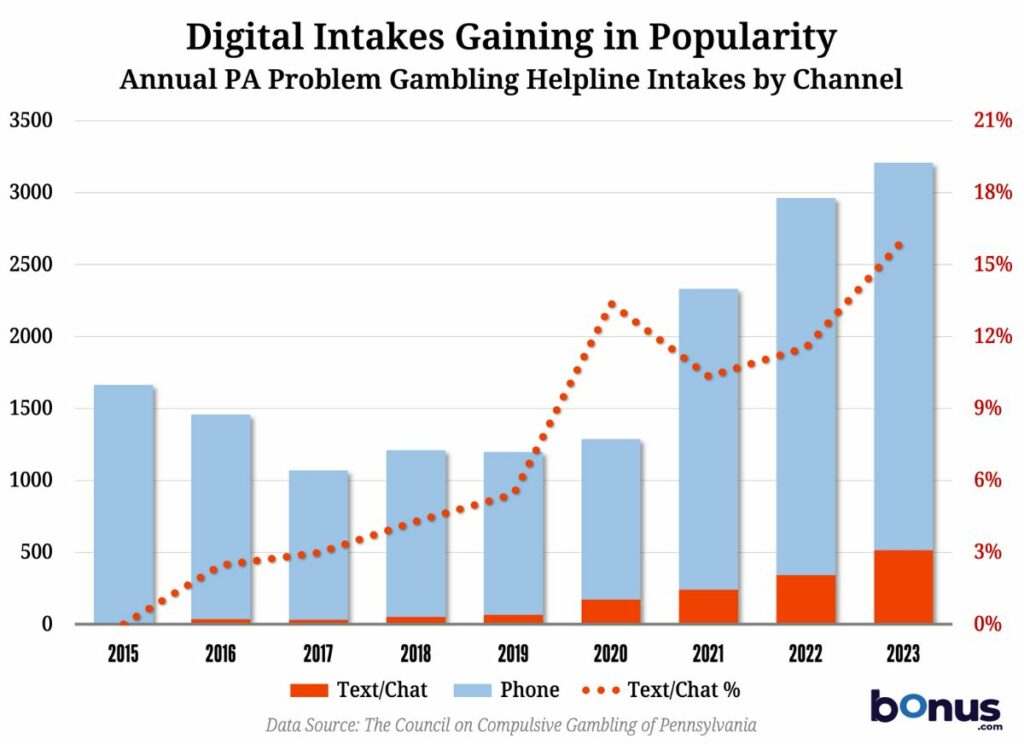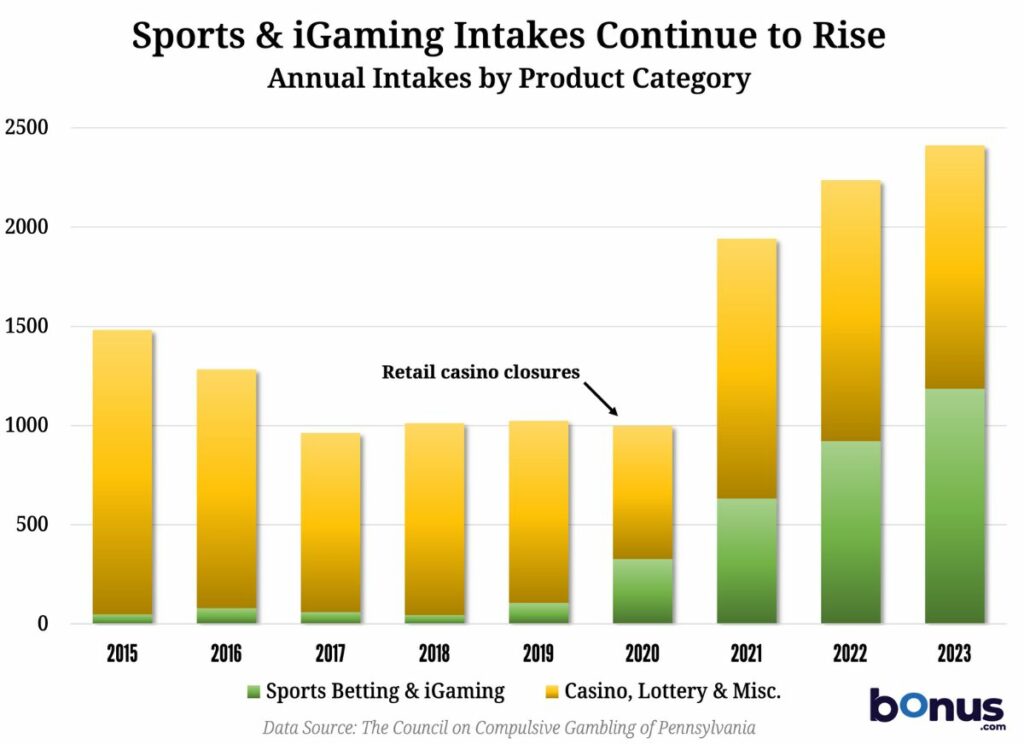
Last year, Pennsylvanians increasingly sought problem gambling help via text and online chat, according to data from the Council on Compulsive Gambling of Pennsylvania (CCGP). CCGP is responsible for promoting and monitoring 1-800-GAMBLER helpline use in the state.
Ahead of the release of its annual report, CCGP shared its call data with Bonus and PlayUSA. In addition to more people reaching out via chat or text, the data shows that more Pennsylvanians called for help with problem gambling in 2023. However, the numbers also show requests dropped dramatically in the year’s latter months.
This suggests the crisis may have peaked last spring, according to Alex Weldon’s analysis at PlayUSA.
Overall, 2023 intakes—how CCPG labels requests for help—rose only slightly over 2022 totals (3208 vs. 2963). However, the percentage of residents accessing help through the text/chat options available on CCGP’s website jumped nearly 5 percentage points to 16.1%. The total number of such intakes was up over 50% year-over-year.
CCGP’s executive director, Josh Ercole, told Bonus via email the reasoning is likely two-fold.
Specifically, he suggested increased promotion of text and chat options, and a steady increase in younger demographics seeking help played a role.
We have certainly been more active in promoting these forms of communication on Social Media platforms and in statewide awareness programming. I imagine that, along with the continued increase in younger folks reaching out and using these methods, probably has something to do with what we’re seeing.
Demographics, Online Ads Boost Text, Chat Uptake

It’s worth noting that Pennsylvania data shows 1-800-Gambler and the state’s other helplines receive more total calls than intakes.
In most cases, the discrepancy stems from two sources: hang-ups and callers mistakenly seeking information about the lottery or state casinos.
For 2023, the helpline received 17,970 total calls, with intakes accounting for 17.9% of the call volume. In contrast, fewer overall calls (14,146) and slightly fewer intakes meant the intake rate hit 19.5% in 2022. To date, the percentage is Pennsylvania’s all-time high.
However, while data shows a near-steady rise in text/chat intakes since the tools became available in 2015, those increases historically align with rising call totals. Unsurprisingly, the last significant jump in text/chat intakes was during the pandemic shutdown in 2020. Between 2019 and 2020, those intakes jumped eight points (5.4-13.4%).
As Ercole noted above, this time, the increase is likely related to a boost in online advertising and younger demographics seeking help.
On the demographic side, since 2020, about 40% of helpline callers have been 34 or younger, while nearly 39% range between 35 and 54. In 2023, calls from those 54 and under account for 79.8% of intakes, an all-time high for younger demographics.
So, with more younger folks seeking help and increased promotion of the helpline’s online tools, it’s unsurprising to see Pennsylvanians choosing modern options.
Digital Media Push Aligns with More Use of Digital Tools
Over the last four to five years, CCPG has gradually transitioned from a print focus to digital media and advertising. The process, Ercole said in a follow-up interview, has been eye-opening.
If I have a billboard on Pennsylvania Turnpike, I hope it works. That’s kind of where it stops and starts. But, if we have ads on TikTok, we can get analytics that shows 13 to 17-year-olds are clicking at a higher rate than on Facebook or Instagram.
We can go to our website analytics and find that most of the traffic is coming from the DraftKings website and TikTok ads. And we can see that visitors spend an average of two to four minutes on this page and three minutes on this page.

While the shift in focus started earlier, Ercole told Bonus CCGP “hit the gas” about 18 months ago, which aligns with the recent jump in text and chat intakes.
While the CCGP has yet to abandon print advertising, Ercole said measuring its impact is difficult. For example, a billboard the Council maintains on one of the main routes into Philly gets lots of eyes, which is, on its own, beneficial.
However, looking at the helpline report, as an intake driver, the billboard impact is “virtually non-existent,” he added.
Online Games Reach Problematic Parity
The shift to online advertising explains another phenomenon in Pennsylvania’s helpline reports.
Until 2019, retail casino games historically accounted for 75-80% of the problem games noted during helpline intakes.
However, with the launch of Pennsylvania’s first online casinos that year, the percentage shifted, with online games noted as the main problem for about 25% of callers. Simultaneously, casino games dropped to nearly 50%, with ‘everything else’ instigating the remainder.
Since that first shift, levels remained relatively static until 2023, when 37% of callers reported internet games as the reason for seeking help. At the same time, the number of callers identifying casino games as their primary problem dropped by almost the same amount, to 36%.
It’s not clear why the breakdown didn’t change much in 2021 and 2022. However, CCGP’s recent shift of emphasis to online channels helps explain the change in 2023.
Ercole told Bonus that CCGP continues to watch the data closely.
As we continue to see expansion and availability in this newer platform, the revenues and new accounts continue to increase and participation continues to grow. It’s inevitable that with this, we’ll see new problems – it’s our job to try to help prevent those new problems from starting, but if they do start, we need to meet those folks where they are to connect them with help.
March is Problem Gambling Awareness Month (PGAM). If you’re struggling and need help, 1-800-Gambler is a good first step. Visit Bonus’ Responsible Gambling resource for more options.





